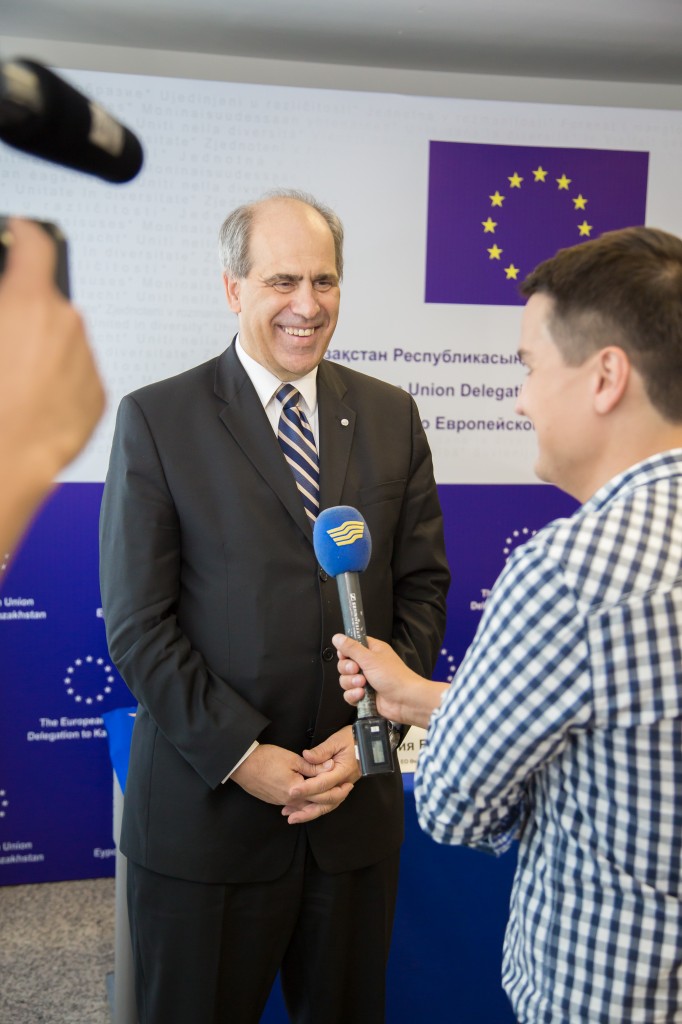
EU Special Representative for Central Asia Peter Burian speaks with reporters after the briefing on June 30.
ASTANA – The European Union’s revised Strategy for Central Asia provides increased engagement with the region through more flexible cooperation formats and a budget for bilateral and regional cooperation formats of more than 1 billion euros, an increase of 56 percent, EU Special Representative for Central Asia Peter Burian said at a press conference in Astana on June 30.
“The updated EU Central Asia Strategy provides a solid ground for strengthening EU–Central Asia partnership and cooperation,” he said at the briefing. “We believe that the new elements and more flexible formats for cooperation envisaged in the strategy will provide a very solid basis for increased interaction and result-oriented cooperation of the EU with countries of Central Asia also in the area of security. … Regional security for development belongs to one of crucial focal sectors for our regional cooperation in Central Asia.”
The Council of the European Union adopted conclusions on the EU Strategy for Central Asia on June 22. “The main objectives and priority areas of the 2007 EU Strategy for Central Asia remain pertinent,” an EU delegation press release on Burian’s visit stated. “The council calls for strengthening trade and energy links between the EU and Central Asian countries and reinforcing cooperation on security and stability, including sustainable management of natural resources. It emphasises the fundamental importance of democratisation, respect for human rights and the rule of law, and socio-economic development, all of which are essential elements of the strategy.”
Burian commented that education would also be an EU priority in the region, and that 115 million euros had been budgeted for the Erasmus+ educational cooperation programme in the region.
The conclusions adopted say the council “particularly welcomes the conclusion of negotiations and initialling of the Enhanced Partnership and Cooperation Agreement with Kazakhstan.” It also supported Kazakhstan’s accession to the World Trade Organisation.
Kazakhstan had called for a Central Asia strategy that took more into account the political and socio-economic differences between the states of the region, contributing white papers and other opinions to the review of the strategy. The conclusions adopted by the council state that “[Mo]re than in the past, the depth of relations will also depend on the ambitions and needs of individual Central Asian countries to take forward our bilateral relationships. The EU will take full account of the growing differences in socio-economic development and ambition to engage in cooperation with Europe between the five countries. In some cooperation areas this will require re-assessing the balance between regional and bilateral engagements to achieve more concrete results and reforms.”
Human rights are also to be a focus, and Burian noted that the EU wants to continue cooperation on human rights, the rule of law and good governance, and to continue providing support for reforms. The council in particular called for more involvement of civil society in cooperative programmes and dialogue platforms. A stable legal framework, reliable investment climates, fighting corruption and creating connections with the international business community are also goals, he said.
Security has been an EU regional priority for some time, Burian commented. During the last review, in 2012, the council proposed a regular EU-Central Asia High Level Security Dialogue in a regional format and increased counter-terrorism cooperation. The latest review also counsels the EU to adjust its security focus according to newly identified challenges, particularly on migration, counter-terrorism and border security.
While in Astana, Burian attended the Central and South Asian Regional Conference on Countering Violennt Extremism, held on June 29–30 as the representative of the EU. He also met with Kazakh officials including Prime Minister Karim Massimov and Minister of Foreign Affairs Erlan Idrissov, the EU delegation reported.
